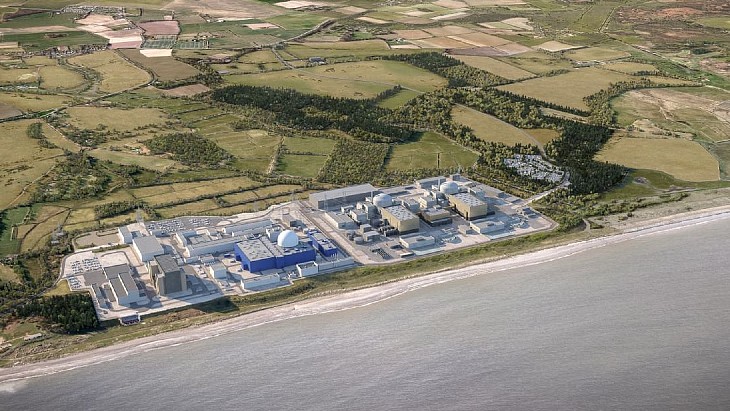UK government ministers have announced the release of GBP170 million (USD218 million) funding to take forward development work to prepare the Sizewell C site "for future construction, procure key components from the project's supply chain, and expand its workforce".

Sizewell C (right) will be built next to Sizewell B (Image: Sizewell C)
The money is part of the GBP700 million investment scheme to fund Sizewell C's continuing development so it can get to the point of a final investment decision. At its peak during construction, Sizewell C is projected to support 10,000 jobs across the UK.
The UK's Energy Security Secretary Grant Shapps said that following the launch of the arms-length Great British Nuclear organisation last week the announced investment "demonstrates the government's commitment to the continued development of Sizewell C, which represents the bridge between the ongoing construction of Hinkley Point C and our longer-term ambition to provide up to a quarter of the UK's electricity from homegrown nuclear energy by 2050".
Nuclear and Networks Minister Andrew Bowie added: "The steps we're taking today will speed up the development of one of our biggest projects, Sizewell C, towards final approval, which would enable construction to start as soon as possible, supporting thousands of jobs for communities in Suffolk and across the country."
The plan is for Sizewell C to feature two EPRs producing 3.2 GW of electricity, enough to power the equivalent of around six million homes. It would be a "replica" of the Hinkley Point C plant, under construction in Somerset. EDF Energy submitted a development consent order (a planning application) for the plant in May 2020, which was granted in July last year.
EDF agreed in October 2015 with China General Nuclear (CGN) to develop the Sizewell C project to the point where a final investment decision could be made. EDF had an 80% stake and CGN a 20% stake but the UK government's attitude to Chinese involvement in such UK projects has since changed and in November last year it paid GBP679 million to become a 50% partner alongside EDF, with CGN exiting the project. In March this year, the UK's Environment Agency granted environmental permits - a radioactive substances activity permit, a combustion activity permit and a water discharge activity permit - for the plant.
EDF said in November that construction of the plant remained subject to a final investment decision and said the "final investment decision remained subject to the achievement of certain key stages, in particular the ability to raise the necessary financing to carry out the project as well as the deconsolidation of the project from the Group's balance sheet", adding that it planned to "retain only a minority stake in the final investment decision - a maximum of 20%". It said it hoped to make a final investment decision in 2023.
The UK's energy strategy unveiled in April set the target for eight new reactors plus small modular reactors to produce 24 GWe capacity by 2050, meeting about 25% of the UK's projected electricity demand. The UK currently generates about 15% of its electricity from about 6.5 GW of nuclear capacity.
Researched and written by World Nuclear News